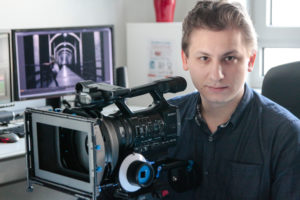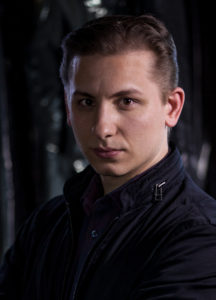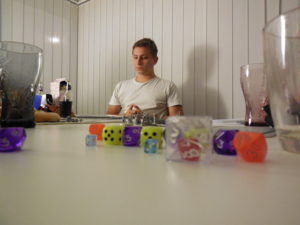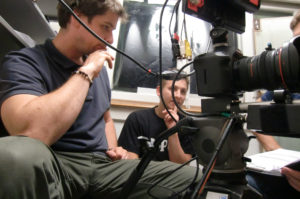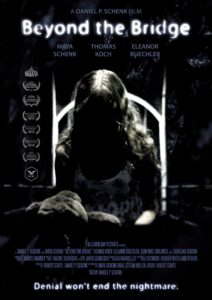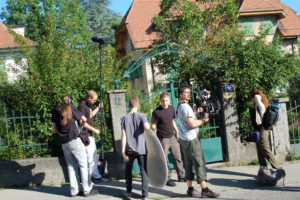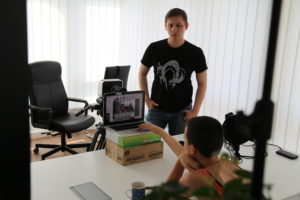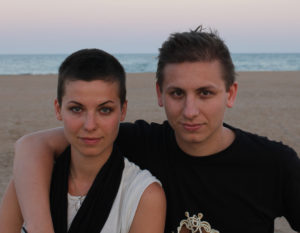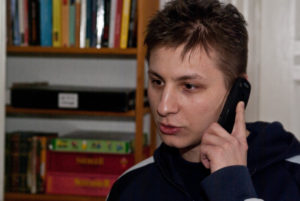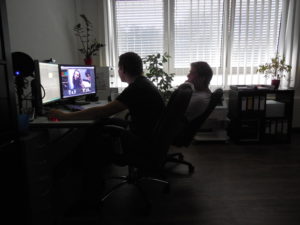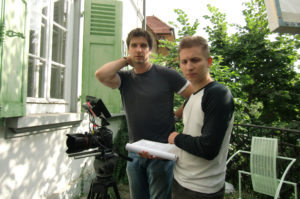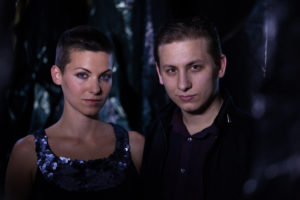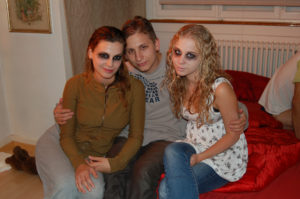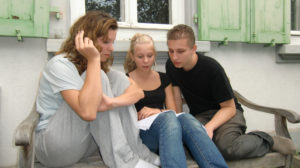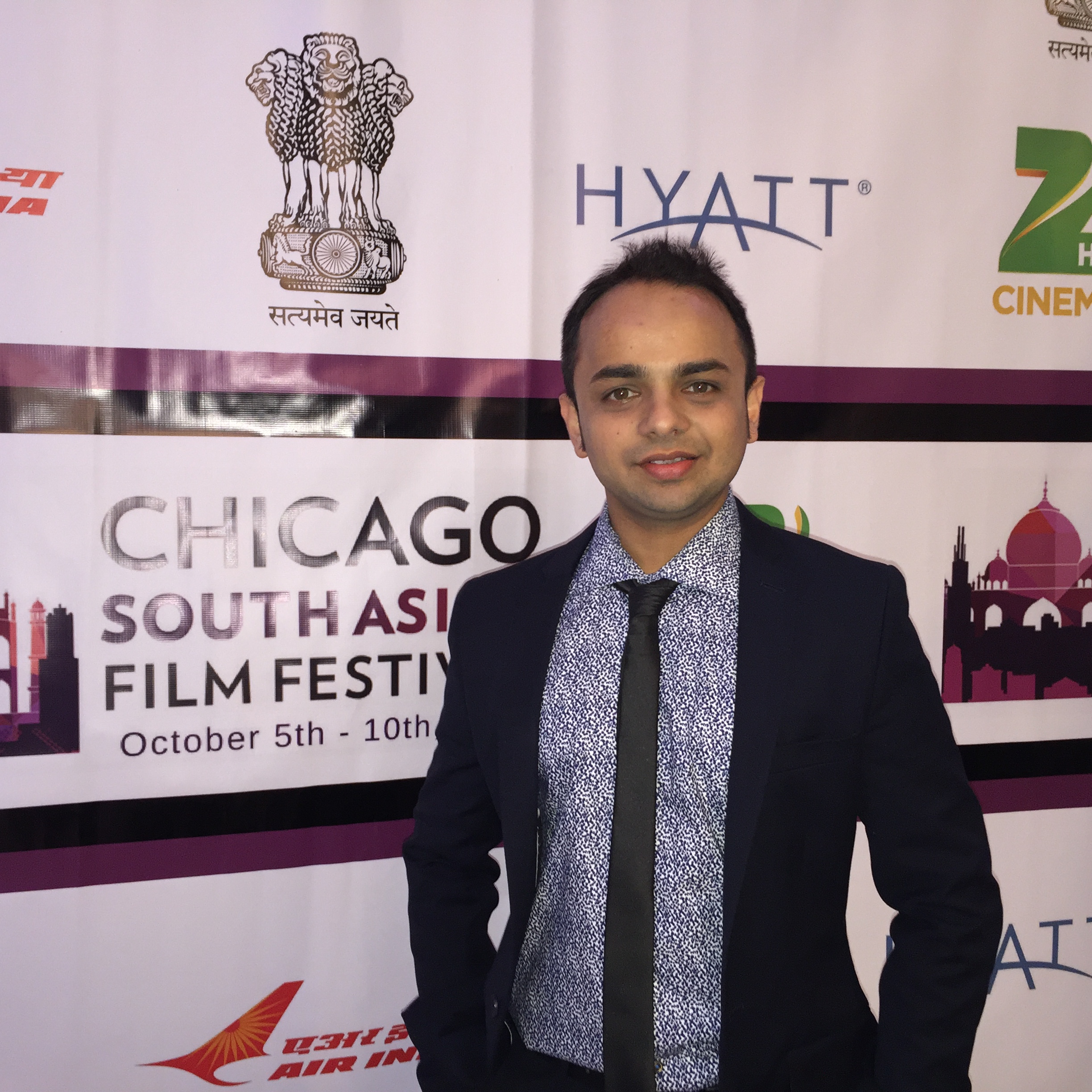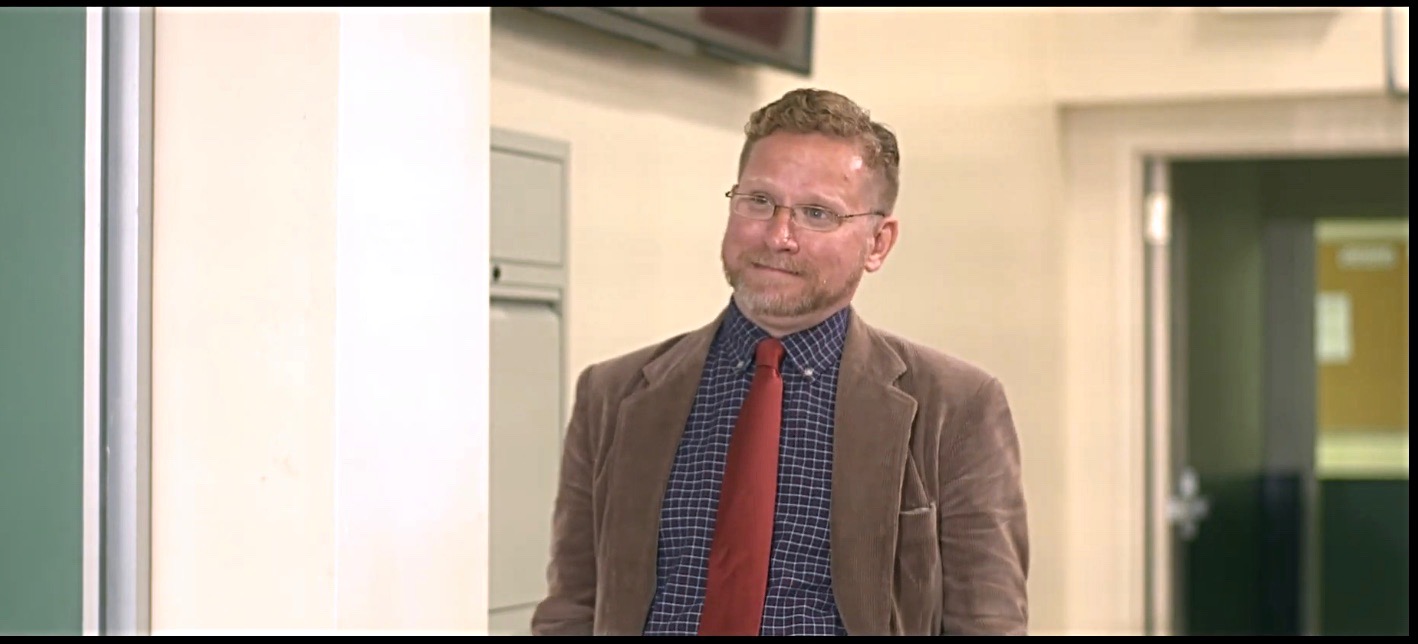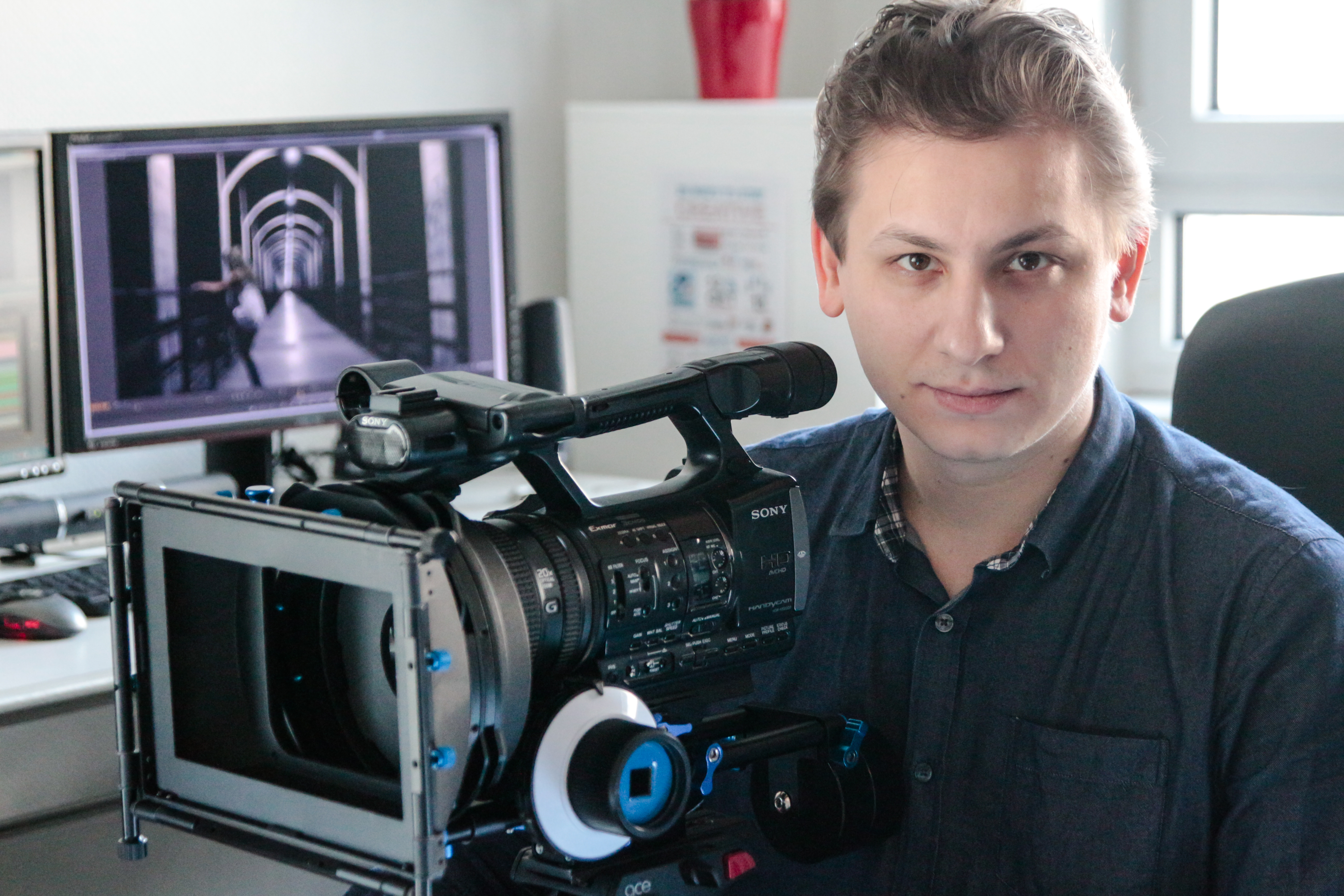
In Their Own Words: Writer/Director Daniel P. Schenk of “Beyond The Bridge”
Greetings to all readers, new and returning, young and old! Welcome to the newest entry within the “In Their Own Words” section at OneFilmFan.com! Here, I take the opportunity to interview some of the most amazing talents, rising and veteran, in the indie film world, as well as Hollywood and soon, Bollywood! Actors, actresses, directors, writers, producers, and all-around filmmakers, we have the pleasure of gaining insight into their lives, beginnings, passions, and general thoughts on the art form so many of them call their career.
One of the biggest and most exciting aspects of my film reviewing journey at OneFilmFan.com is to have established connections with film-centered talents from not just the United States, but now in over 15 foreign countries as well. Therefore, I bring you this fresh interview with a truly deserving, ascending presence on the writer/director front in Germany. Having just recently released his new feature length effort, “Beyond The Bridge”, Daniel P. Schenk offered me the chance to ask him some in depth questions about this experience and everything that makes him who he is, while also indicating where he’s yet to go and beyond! So, no further intro required, let’s get to my questions with the man himself!
One Film Fan: To begin, tell readers a little about who Daniel P. Schenk is via some general background about you, then where the initial interest in film came from. Secondly, when did it become apparent film was going to be more than just an interest for you?
Daniel P. Schenk: Starting with the basics: My name is Daniel P. Schenk, or DPS for short, and I’m a German filmmaker and novelist. Besides working on my next feature films and novels, I’m also the owner of FALLENDREAM Pictures, a small production company which realizes commercial works. I was born in Orwell’s year and live peacefully in the German Outback, communicating with the real world mainly over mankind’s second fire, aka the internet. I don’t have an editor at hand, which is why my English might sound a little off (or plain wrong) at times. Sorry!
I’m in a serious relationship with movies since I can remember. That passion was forced upon me by my Dad at an age where I couldn’t resist–it was our “thing”. It felt natural, and I guess I’m the first person who can talk about his movie passion as if it was child abuse. But seriously, I learned a great deal about movies and movie history from my Dad, who had a collection of thousands(!) of VHS cassettes in the late 80’s and early 90’s, hence my transition from “consumer” to “producer” was very fluent.
But, there was indeed one special moment where I realized that making movies had to be more than a hobby. I was sixteen and my cousin’s family came to visit us. We didn’t see each other quite often, and while hanging out, my cousin and I talked about our future plans. I told him that I was thinking about becoming a video game journalist (which is the truth!), but then all of a sudden he said: “Oh, really? I thought you’d become a film director or something”. I was baffled, because at this point in time, that idea was a very, very low voice in my head. Yet, hearing it from the outside–from someone who really didn’t know me that well–had quite an impact on my further development.
O.F.F.: How did you further learn the art of film (ie: mentors, influences, and schooling)?
D.P.S.: I consider myself a classic autodidact. One of the first books I bought was “Directing” by Michael Rabinger, and learning from books and tutorials never stopped after that. I’m not that much of an outgoing person and I grew up in (and later returned to) a rural area–so finding mentors and learning by watching was never an option. Whatever I wanted to learn, I had to learn it by doing it myself. Years after my first two movies, “A Gamer’s Day” and “The Cheat Report”, I also visited the SAE Institute in Cologne and got a bachelor’s degree. It was a nice thing to get, and it helped me expanding my network. But, the best way for me to hone my craft was still to start my own, next project. Over and over again.
O.F.F.: What was your very first foray into film as a whole, and what did that experience show you about the film community overall?
D.P.S.: That has to be “A Gamer’s Day”. Even if this film was a tremendous success, it ironically taught me nothing about the film community overall, because it stayed tightly in its niche: eSports Gaming. My second movie, “The Cheat Report”, had the same problem. I think it’s only now, with “Beyond The Bridge”, that I slowly got into the film community. The most interesting discovery I made is that there is this whole eco system of devoted and active film aficionados who, just like many indie filmmakers, burn for the idea, for the journey, not for the money or the prestige.
O.F.F.: You’ve taken on acting roles in three of your works: “A Gamer’s Day”, “The Cheat Report”, and “Beyond The Bridge”, the latter of which we will address more directly here soon. How do you find acting as an art form? Real passion or just passing fancy?
D.P.S.: There was a time long ago when I seriously thought about becoming an actor. I took parts in the school theater and received really positive feedback. Applause can be quite addictive, I guess. But, then came those merciless teenage years of puberty and self-consciousness. All of the sudden, everything which forced me out from under the rock I’d hidden via seemed like a terrible idea. At the same time, my desire to tell a story not only through a single performance, but through all possible means, grew stronger and stronger. I realized that no matter what, as an actor, I would always be bound to my physical appearance. That limitation didn’t go well with my imagination. That having been said–I WOULD LOVE TO ACT AGAIN! 🙂 I think acting is a wonderful art form, it’s the emotional engine of cinema. Maybe I will find more some opportunity in future projects.
O.F.F.: Moving into your actions as a director, what was the first project you took on that type of role and was it the catalyst for you to realize maybe this is the direction with film you wanted to go?
D.P.S.: I never thought of it that way. My desire of becoming a film director was nothing more than the extension of my desire to tell stories, to be the architect of a fictional world. So, it was a very organic process, starting from when I was like 5 years old, drawing my first Teenage Mutant Ninja Turtles comics. I then wrote short stories and created Pen&Paper roleplaying games, but finally I realized that the medium “film” would be the most powerful way to tell my stories. If I have to pinpoint a certain project in which I technically took on the director role for the first time, I guess it has to be a school project. It was a documentary about the Middle Ages, and yes, indeed, the positive feedback from my teacher and my class boosted my decision to go down that route.
O.F.F.: Per projects of yours I’ve seen highlighted on your website, you’ve also delved into another form of film via music videos. How does that format compare for you as opposed to short/feature films? Preference between them or enjoy each medium equally?
D.P.S.: I deeply admire music videos as an art form, and I believe that a well done music video might have as much influence on the viewer as a feature film. However, making them requires another mind set. Although there are great story-driven music videos out there, I think that telling a story is not their primary concern. If you had to write music videos down, they’d have more in common with a poem than with a novel. The visual idea is more dominant. They get you by the feels, and they have to get you fast.
That’s refreshing and challenging, because I’m more of a novel guy, who gets you slowly–like a python. So, I like doing them once in a while, but only if I find a song that inspires me and an artist who will give me the freedom to follow my inspiration. Those are two big “Ifs”. Music videos are ultimately promotion tools, so they have to fit into the artist’s brand, the publisher’s strategy, and so on. I have a great deal of respect for those directors who can navigate their way through this minefield and still deliver art.
O.F.F.: Ok, onto your current project, the psycho-thriller “Beyond The Bridge”. What drew you to make this film? How did the idea for it form?
D.P.S.: There were three basic reasons and inspirations for “Beyond The Bridge”. First, I was fascinated by the idea of sending a young female protagonist into a personal, surreal hell–going psycho as much as I can, with the help of a small creature, which would not stop haunting her. Second, it was the right time and the right place, as I had all the elements I needed to tell a psycho-thriller with a minimal budget. My wonderful sister Maya, who now is a successful music artist in London, was eager to play her first big role. My good friend/producer/DP Robert Staffl wanted to turn that story into a film.
I had access to an old, atmospheric house, and the whole city kept some great locations ready, like the endless bridge or the creepy cave. Then thirdly, I read a dark poem on the very bridge we shot on. It went something like the poem we’re using in the movie. It was that kind of poem you’d write shortly before you commit something terrible. So, it set my imagination in motion–what could have been the events, what could have been the trauma, which led that poor soul to these lines?
O.F.F.: Tell us the basic plotline for readers who have yet to see the film. (NO spoilers!)
D.P.S.: I’ll go with the official description! After two years abroad, art student Marla Singer returns to her abandoned family house. Her parents died some time ago, and she wants to say goodbye to her past. But, a party with old friends and a mysterious drug send her into a nightmare from which she never awakes again. From now on, during five nights, Marla gets terrorized by an unspeakable threat from the dark, while making strange discoveries in her otherwise well-known house. Dismissing her experiences as aftermath from bad pills, she tries to focus on her semester project as good as possible.
But, the night always comes. She gets support from her former housekeeper Emma, who consoles her over the phone, and from her ex-boyfriend Eric, who desperately tries to deny that he still has feelings for her. Her old friend Barbara further helps to create a comforting atmosphere–or are they all part of the problem? Soon, more questions arise. Why did the prank-loving party guest Jean hide the strong analgesic Pentagol in her house? Are her disturbing experiences really drug-induced hallucinations? Plus, who is that Bridge Girl that enters her dreams? The more Marla looks for distraction, the more she realizes that everything is connected.
O.F.F.: The themes found within the narrative are quite jarring at times, but other times so acutely realistic. Was there an intentionality to make this something viewers might actually be able to relate to on some level, rather than just straight fiction? Either way, some creepy material!
D.P.S.: Thank you! I’m very happy when the audience relates to the story on some level, because generally speaking, I always fear to tell a story which is just off the charts. It might be that fear that brings back some authenticity and “realness” in an otherwise surreal plot. I never forget the audience, even if I stretch their expectations. It’s like I’m telling them–“Look, I know that I’m going to tell you some crazy stuff, and I totally get your irritation, but bear with me, I’m just as normal as you, and this whole thing gets to me as much as to you”. Put in other words, “A feeling of normality increases the surreal punch”.
O.F.F.: After screening the project, I felt one of the strengths of it is the “slow burn” approach, slowly building to the more intense second act. Again, intentional?
D.P.S.: I’ve come to the conclusion that that’s just the way I work as a storyteller. I’m always asking for some patience. As I’ve heard time and time again from my audience, it pays off in the end. But, I need some time to get everything in position. Of course, “Beyond the Bridge” got a theme which works terrifyingly well with that approach. Marla’s subconscious works hard to create a distance between herself and the movie’s events, yet we watch that distance slowly melt. It’s just like with the very feeling of distance itself–in the beginning, you don’t see much of a difference, but as the distance decreases, the object appears faster and faster. To conclude, the “slow burn” approach is partly intentional, and partly built into my DNA.
O.F.F.: Being the film’s writer as well, what challenges, if any, did it present to create a story that would be unique enough to stand out in a much-covered psycho-thriller genre?
D.P.S.: I didn’t desperately try to be original, but I don’t like repeating stuff or just improving upon it. I’m bored easily, and I need to feel a tickle in my brain when I think about an idea. What I hoped to achieve was taking classical genre elements and interpreting them in a different-than-usual way. As soon as I had developed the story’s “backbone”, the “why”, the “what-is-this-really-about”, I just gave my best to point every element in that direction. Being honest about what you want to tell, and why you want to tell it, helps.
O.F.F.: A great cast—your sisters Maya and Carolina Schenk, Thomas Koch, Eleanor Buechler, Jean-Noel Molinier. What was the process of casting them and what was it like to work with them all on this project?
D.P.S.: I prefer working with people I know and trust, which is why I cast my two sisters Maya and Carolina. The other roles called for new faces, and we cast them by doing an online casting. They filmed themselves reading a scene and sent that footage over. It worked pretty well, since we had no budget for a casting director. It was a really great cast, and it was fun working with them. As with my sisters, it didn’t even feel like “work”. It felt like playing, but with all those expensive toys your parents never allowed you to touch. Say, for example, the family house. That was exactly what we did!
Then again, it was a big challenge, because Maya never played in a feature film before. There was a lot of trust involved, on all sides. But, it turned out terrific. Eleanor and Thomas were professionals through and through, and their structured, precise approach helped Maya a lot in their dialogue scenes. Thomas especially did a lot of “homework”, because Eric is a much darker, much more resentful person than Thomas himself, who is such a delightful and charming guy. He really did an impressive transformation. Jean-Noel, another non-professional, killed it with his over-the-top performance as the good-for-nothing Jean. His psycho dance is one of my personal highlights in the film, I really bought it.
O.F.F.: What other projects are on the horizon or would you LIKE to be involved in currently?
D.P.S.: I’m working on several projects right now. One is a monthly Pen&Paper live streaming format. Then, there is my next episodic novel, a dark alternate reality saga about human-eating creatures and special agents fighting against each other. I’m also writing my next feature film script about a young and troubled outsider who plans something unspeakable, until a very unexpected thing happens. I’d love to get in contact with some international producers who would help me in getting a budget, and in that case, I’d be really open in what my next big project would be.
O.F.F.: Independent film is arguably one of the hardest overall mediums to create in, with everything from limited budgets to time constraints to trying to gain exposure and notoriety IF you manage to complete your project, etc, etc. Talk a bit about how your experiences to date within this indie community have helped you grow. Had to be some times where you thought about giving up, right?
D.P.S.: The film took five years to complete, which is about four years more than planned. It was more than hard. It was soul wrenching. It stopped me from doing anything else creatively. We had no budget left over. We had no distribution deal in sight. I saw everyone around me, one by one, losing interest in that ambitious venture. I saw my own energy fading. Once, my very own sister, who was the co-producer and the lead actress, told me: “Daniel, I’m seeing what this film is doing to you. Maybe you should leave it behind, I wouldn’t blame you”. This was such a nice thing of her to say, you can’t imagine how much this kind of personal support meant to me, but at the same time, it was absolutely no option for me. It never was, really. I always knew I would finish that film, or finish nothing else thereafter.
As an independent artist, your word and your integrity is your capital, and not wasting that capital was the single most important thing for me at one point. It was like a marathon during which I had a break down. I landed in the roadside ditch, all other runners getting past me, sun goes down, a cold moon rises, I’m still laying there, next morning, the race is obviously over, but I’m still getting up to finish it. I couldn’t live up to all expectations, but I completed what I began and in the end, that’s what your first marathon should be all about–getting over the finish line. If this metaphor of my production journey doesn’t sound pleasant, it’s because it absolutely wasn’t. But at the same time, this whole thing–those whole five, painful years–were the very last test I needed to prove to myself that this is what I basically want to do for the rest of my life. I still wouldn’t have it any other way.
O.F.F.: As a follow-up, how important do you feel it is that those fans and fellow filmmakers all around the world who thrive on and elate in indie film efforts shout it from the mountain tops and be part of promoting projects, especially in this day and age of social media, YouTube, Amazon, iTunes, etc available as platforms for distribution?
D.P.S.: As a filmmaker, you can no longer ignore the marketing aspect of your movie. You really have to train yourself to STAY close to your film after you delivered your final cut. As uncle Ben and others before him said–“With great power comes great responsibility”. Nowadays, you can get your movie so incredibly fast and efficiently to your audience, but all this technological advance comes at a price. Everyone can do it now, so you have to go that extra mile to stand out. Fans, on the other hand, should realize that their voice actually counts. One good review on Amazon, on IMDB or YouTube can make a difference, especially in the early phase. Creating hype might be difficult, and depending on your subject, impossible–but there’s no excuse for not trying.
O.F.F.: Ok, the classic final question! What is your favorite film of all time and why?
D.P.S.: That is absolutely impossible for me to answer. I have watched so many films and experienced so many magical moments with them, I can’t pick one. They all flow through me, from head to toe, and I cannot detach them from my very substance. I can tell you the worst, though. “The Room”. Easy. Oh, and “Independence Day 2”.
Are you reading and listening, film producers far and wide? There’s a new, young, driven talent in the biz with the initials D.P.S. who wants to hear from you! With the kind of passion exhibited so profoundly within the worldwide independent community of filmmakers, it is more than clear that Daniel P. Schenk has learned valuable lessons about perseverance and maintaining focus, even in those times where those elements would be the last thing he’d desire to strive for. This reviewer is personally thankful he DIDN’T give up on his feature film “Beyond The Bridge”, and the final product honestly speaks for itself. It harkens to future times where more and more, indie film will make its mark and shine even brighter in the world spotlight.
So, interested in following the activities and what’s what with this rising indie star, as well as how to support indie film and purchase “Beyond The Bridge”? Check out the following ways to do all of that:
“Follow” Daniel on his Twitter account: Here
“Like” Daniel’s Facebook Page: Here
View Daniel’s website: Here
“Follow” the “Beyond The Bridge” Twitter account: Here
“Like” the “Beyond The Bridge” Facebook Page: Here
Check out the film’s website: Here
Purchase at Amazon Prime or DVD/Blu-Ray: Here
Well folks, that wraps up the newest edition of “In Their Own Words”! A huge, heartfelt “Thank You!!!” again to Daniel P. Schenk for taking the time to do this interview for OneFilmFan.com, as it is truly, sincerely appreciated! I hope we all wish nothing but the best success to Daniel in all future endeavors and the indie world holds its breath for what he offers us next! As always, this is all for your consideration and comment! Until next time, everyone, thank YOU for reading, spreading the word, supporting OneFilmFan.com!
